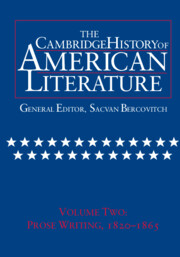Book contents
- Frontmatter
- Introduction
- CONDITIONS OF LITERARY VOCATION
- THE LITERATURE OF EXPANSION AND RACE
- THE TRANSCENDENTALISTS
- 1 Unitarian Beginnings
- 2 The Assault on Locke
- 3 Carlyle and the Beginnings of American Transcendentalism
- 4 “Annus Mirabilis”
- 5 The Establishment and the Movement
- 6 Letters and Social Aims
- 7 The Hope of Reform
- 8 Diaspora
- 9 The Antislavery Years
- NARRATIVE FORMS
- Chronology
- Bibliography
- Index
8 - Diaspora
from THE TRANSCENDENTALISTS
Published online by Cambridge University Press: 28 March 2008
- Frontmatter
- Introduction
- CONDITIONS OF LITERARY VOCATION
- THE LITERATURE OF EXPANSION AND RACE
- THE TRANSCENDENTALISTS
- 1 Unitarian Beginnings
- 2 The Assault on Locke
- 3 Carlyle and the Beginnings of American Transcendentalism
- 4 “Annus Mirabilis”
- 5 The Establishment and the Movement
- 6 Letters and Social Aims
- 7 The Hope of Reform
- 8 Diaspora
- 9 The Antislavery Years
- NARRATIVE FORMS
- Chronology
- Bibliography
- Index
Summary
The 1840s witnessed the slow fragmentation of the Transcendentalist movement and the departure of its members upon paths of their own. The last meeting of the Transcendental Club was probably the meeting held in September 1840. The Dial ceased publication in 1844. The members of the group continued to meet and talk with one another, to write letters to one another, to attend one another's lectures, and to read one another's books; but they had begun to break into smaller groups defined by interest, personal affection, or ideology and to regard one another with friendly curiosity rather than with feelings of solidarity. Some of them returned to the Boston area after years of exile; others departed from it on long journeys. Some remained within the Unitarian church (two even become professors at the Harvard Divinity School); some left it for other religions or for a “church of the future” they hoped would materialize. Most found themselves being drawn into one of the practical reform movements of the day – association, prison reform, opposition to the Mexican War, antislavery. Two witnessed the European revolutions of 1848, for Emerson crossed the channel from England to witness the celebrations on the Champ de Mars during the French uprising, and Margaret Fuller ran a hospital during the siege of Rome.
Convers Francis slid gently from his position as the elder statesman among the Transcendentalists (he was five years older than Alcott, eight years older than Emerson) to a Harvard professorship. Francis had been ordained as minister to a congregation at Watertown in 1819 and remained in that post until he was invited to become professor of pulpit eloquence and pastoral care at the Divinity School in 1842.
- Type
- Chapter
- Information
- The Cambridge History of American Literature , pp. 495 - 547Publisher: Cambridge University PressPrint publication year: 1995



